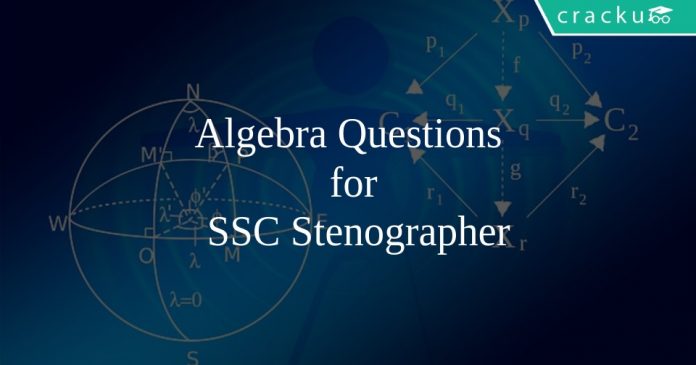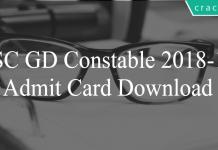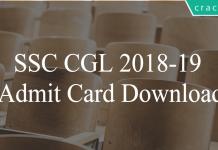Algebra Questions for SSC Stenographer
SSC Stenographer Algebra Questions and Answers download PDF based on previous year question papers of SSC exam. Top – 15 Very important Algebra Questions for Stenographer.
Download Algebra Questions for SSC Stenographer
15 Stenographer Mock Tests – Just Rs. 149
Download All Important SSC Stenographer Questions PDF (Topic-Wise)
Question 1: $\sqrt{8 + \sqrt{57 + \sqrt{38 + \sqrt{108 + \sqrt{169}}}}}$
a) 4
b) 6
c) 8
d) 10
Question 2: What is the value of $\frac{(941+149)^{2}+(941-149)^{2}}{(941\times941+149\times149)}?$
a) 10
b) 2
c) 1
d) 100
Question 3: If a (2+ √3) = b (2 – √3) then the value of $1/(a^2+1)+1/(b^2+1)$ is
a) -5
b) 1
c) 4
d) 9
Question 4: If $a^{2}+1=a$, then the value of $a^{12}+a^{6}+1$ is :
a) -3
b) 1
c) 2
d) 3
Question 5: If $a=\frac{2+\sqrt{3}}{2-\sqrt{3}}$ and $b=\frac{2-\sqrt{3}}{2+\sqrt{3}}$, then the value of $a^2+b^2+a \times b$ is
a) 185
b) 195
c) 200
d) 175
SSC STENOGRAPHER PREVIOUS PAPERS
SSC Stenographer Free Mock Test
Question 6: If $ x + \frac{1}{x} = 99$, find the value of $\frac{100x}{2x^2 + 102x + 2}$
a) 1/6
b) 1/2
c) 1/3
d) 1/4
Question 7: If 2x – 2(4 – x) < 2x – 3 < 3x + 3; then x can take which of the following values?
a) 2
b) 3
c) 4
d) 5
Question 8: If (x + y):(x – y) = 5:2, find value of (4x + 5y) / (x – 4y)
a) 43/5
b) -5/43
c) -43/5
d) 5/43
Question 9: Which of the following equations has the sum of its roots as 5?
a) $x^{2}-5x+6 = 0$
b) $x^{2}-6x-5 = 0$
c) $x^{2}+5x+6 = 0$
d) $x^{2}+6x-5 = 0$
Question 10: $(2x + 5)^{2} \times (4x-1) – (3x^{3} -16x^{2} + 25x -21)$
a) $13x^{3}+92x^{2} -55x+4$
b) $13x^3-92x^2-55x-4$
c) $13x^{3}+ 92x^{2}+55x-4$
d) $13x^{3}-92x^{2}+55x+4$
SSC Stenographer Previous Papers
SSC STENOGRAPHER STUDY MATERIAL TOPIC-WISE
Question 11: What is the value of 299996 x 300004?
a) 89999999984
b) 89999699984
c) 89999999884
d) 89999999974
Question 12: If a+b = 8 and ab =15, then $a^{3} + b^{3}$ is
a) 224
b) 244
c) 152
d) 128
Question 13: If $3x+5(4-3x)>2-4x<3x-\frac{x}{3}$; then the value of x is
a) 3
b) 0
c) 2
d) -1
Question 14: Simplify $(b^{5}x^{2}a^{3}z^{4})*(b^{3}x^{2}a^{4}z^{5}) / (a^{2}b^{3}z^{2})$
a) $b^{5}x^{4}a^{5}z^{5}$
b) $b^{5}x^{4}a^{5}z^{7}$
c) $b^{5}x^{4}a^{4}z^{7}$
d) $b^{4}x^{4}a^{5}z^{7}$
Question 15: If xy = 56 and $x^{2} + y^{2} = 113$, then what will be the value of (x + y)?
a) 29
b) 21
c) 36
d) 15
SSC Stenographer Free Mock Test (Latest Pattern)
Answers & Solutions:
1) Answer (A)
Start from the root of 169 then second root will reduce to 11, thrid root will reduce to 7, fourth root will reduce to 8, and finally it reduce to value 4
2) Answer (B)
Expression : $\frac{(941+149)^{2}+(941-149)^{2}}{(941\times941+149\times149)}$
= $\frac{(941^2 + 149^2 + 2.941.149) + (941^2 + 149^2 – 2.941.149)}{941^2 + 149^2}$
= $\frac{2 * (941^2 + 149^2)}{941^2 + 149^2}$
= 2
3) Answer (B)
Let $a =(2-\sqrt{3})$ and $b =(2 + \sqrt{3})$
$a^{2}= 7- 4\sqrt{3}$, and $b^{2}= 7+4\sqrt{3}$
$ \frac{1}{a^2+1}+\frac{1}{b^2+1} = \frac{(a)^{2} + (b)^{2} +2}{((a)^{2}+1)((b)^{2}+1)}$
$(a^{2}+1)(b^{2}+1)$ = $(8-4\sqrt{3})(8+4\sqrt{3})$ = $16(2-\sqrt{3})(2+\sqrt{3}) = 16$
$a^{2} + b^{2} +2= 16$
Thus $ \frac{1}{a^{2}+1}+\frac{1}{b^{2}+1}=1$
4) Answer (D)
Expression : $a^{2}+1=a$
=> $a^2 – a + 1 = 0$
Multiplying by $(a+1)$ on both sides
=> $(a+1)(a^2-a+1) = 0$
=> $a^3 + 1^3 = 0$
=> $a^3 = -1$
To find : $a^{12}+a^{6}+1$
= $(a^3)^4 + (a^3)^2 + 1$
= $(-1)^4 + (-1)^2 + 1$
= $1+1+1 = 3$
5) Answer (B)
$a=\frac{2+\sqrt{3}}{2-\sqrt{3}}$ on rationalising we will get a = $(2 + \surd3)^2$
$b=\frac{2-\sqrt{3}}{2+\sqrt{3}}$ on rationalizing we will get b = $(2 – \surd3)^2$
now putting values of a and b in , $a^2+b^2+a \times b$
$a^2+b^2+a \times b$ = 195
6) Answer (C)
Given : $ x + \frac{1}{x} = 99$
To find : $\frac{100x}{2x^2 + 102x + 2}$
= $\frac{50x}{x^2 + 1 + 51x}$
Dividing numerator and denominator by $x$
= $\frac{50}{x + \frac{1}{x} + 51}$
Substituting value of $(x + \frac{1}{x})$, we get :
= $\frac{50}{99 + 51} = \frac{50}{150}$
= $\frac{1}{3}$
7) Answer (A)
Expression 1 : $2x – 3 < 3x + 3$
=> $3x – 2x$ > $-3 – 3$
=> $x$ > $-6$ ———-(i)
Expression 2 : $2x – 2(4 – x) < 2x – 3$
=> $4x – 8$ < $2x – 3$
=> $4x – 2x$ < $8 – 3$
=> $x$ < $\frac{5}{2}$ ——(ii)
Combining inequalities (i) and (ii), we get : $-6$ < $x$ < $\frac{5}{2}$
Thus, only value that $x$ can take among the options = 2
=> Ans – (A)
8) Answer (C)
Given : $\frac{x + y}{x – y} = \frac{5}{2}$
=> $2x + 2y = 5x – 5y$
=> $2y + 5y = 5x – 2x$ => $7y = 3x$
=> $y = \frac{3x}{7}$
To find : $\frac{4x + 5y}{x – 4y}$
= $[4x + 5(\frac{3x}{7})] \div [x – 4(\frac{3x}{7})]$
= $(4x + \frac{15x}{7}) \div (x – \frac{12x}{7})$
= $(\frac{43x}{7}) \div (\frac{-5x}{7})$
= $\frac{43x}{7} \times \frac{-7}{5x} = \frac{-43}{5}$
=> Ans – (C)
9) Answer (A)
Sum of roots in an equation : $ax^2 + bx + c = 0$ is $-\frac{b}{a}$
(A) : $x^{2}-5x+6 = 0$
=> Sum of roots = $-\frac{-5}{1} = 5$
(B) : $x^{2}-6x-5 = 0$
=> Sum of roots = $-\frac{-6}{1} = 6$
(C) : $x^{2}+5x+6 = 0$
=> Sum of roots = $-\frac{5}{1} = -5$
(D) : $x^{2}+6x-5 = 0$
=> Sum of roots = $-\frac{6}{1} = -6$
=> Ans – (A)
10) Answer (C)
Expression : $(2x + 5)^{2} \times (4x-1) – (3x^{3} -16x^{2} + 25x -21)$
= $[(4x^2 + 20x + 25) \times (4x – 1)] – (3x^3 – 16x^2 + 25x – 21)$
= $[(16x^3 – 4x^2) + (80x^2 – 20x) + (100x – 25)] + (-3x^3 + 16x^2 – 25x + 21)$
= $(16x^3 – 3x^3) + (80x^2 – 4x^2 + 16x^2) + (100x – 25x – 20x) + (-25 + 21)$
= $13x^3 + 92x^2 + 55x – 4$
11) Answer (A)
Expression : 299996 x 300004
= (300000 – 4) x (300000 + 4)
= $(300000)^2 – (4)^2$
= 90000000000 – 16 = 89999999984
=> Ans – (A)
12) Answer (C)
It is given that : $(a+b)=8$ and $ab=15$
Using the expression, $(a^3+b^3)=(a+b)(a^2+b^2-ab)$
= $(8)(a^2+b^2-15)$
Also, $(a^2+b^2)=(a+b)^2-2ab$
= $8[((a+b)^2-2ab)-15]$
= $8[(8^2-(2 \times 15))-15]$
= $8(64-30-15) = 8 \times 19$
= $152$
=> Ans – (C)
13) Answer (C)
Expression 1 : 3x + 5(4 – 3x) > 2 – 4x
=> $3x+20-15x$ > $2-4x$
=> $12x-4x$ < $20-2$
=> $8x$ < $18$
=> $x$ < $\frac{9}{4}$ ———–(i)
Expression 2 : 2 – 4x < 3x – x/3
=> $4x+3x-\frac{x}{3}$ > $2$
=> $\frac{20x}{3}$ > $2$
=> $x$ > $\frac{3}{10}$ ———-(ii)
Combining inequalities (i) and (ii), we get : $\frac{3}{10}$ < $x$ < $\frac{9}{4}$
The only value that $x$ can take among the options = 2
=> Ans – (C)
14) Answer (B)
Expression : $(b^{5}x^{2}a^{3}z^{4})*(b^{3}x^{2}a^{4}z^{5}) / (a^{2}b^{3}z^{2})$
= $(a)^{3+4}(b)^{5+3}(x)^{2+2}(z)^{4+5} \div a^2b^3z^2$
= $a^7b^8x^4z^9 \div a^2b^3z^2$
= $(a)^{7-2}(b)^{8-3}(x)^4(z)^{9-2}$
= $a^5b^5x^4z^7$
=> Ans – (B)
15) Answer (D)
Given : $(x^2 + y^2) = 113$ and $xy = 56$
Using $(x + y)^2 = x^2 + y^2 + 2xy$
=> $(x + y)^2 = 113 + (2 \times 56)$
=> $(x + y)^2 = 113 + 112 = 225$
=> $(x + y) = \sqrt{225} = 15$
=> Ans – (D)
SSC Stenographer Free Mock Test
We hope this Algebra Questions PDF will definitely help in your preparation. Download the cracku app for daily test.





